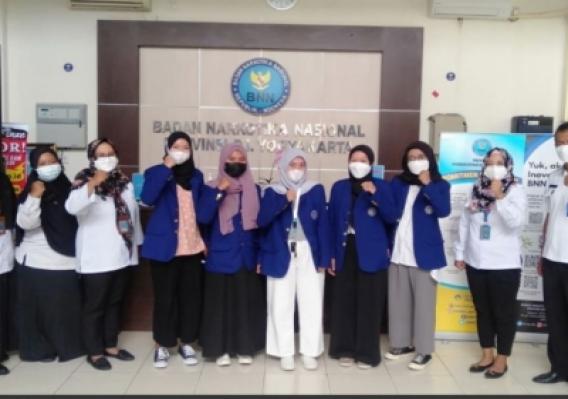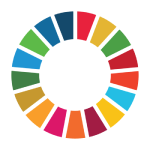Learning more on Prevention and Rehabilition Program of Drug Abuse from BNN

Drug abuse in Yogyakarta is increasing, as evidenced by the disclosure of 28 drug abuse cases from September to October 2021 with 35 suspects by the Regional Police of Yogyakarta. The stage of drug use usually begins with a trial and error stage, which increases to a recreational stage when hanging out with friends. Drug users can also consume actively when they suffer from depression, anxiety, sadness, and stress. When drug users reach the dependence stage, it may interfere with social life, work, or learning processes. The peak of dependence occurs when the user can no longer control himself. Given the terrible dangers of drugs, students of the Social Sciences Education Study Program, Faculty of Social Sciences, UNY visited the Provincial National Narcotics Agency (BNNP) of Yogyakarta to collect and learn knowledge on narcotics for Social Pathology course. They are Rizka Widyantari Emawardhana, Syafriena Isnaini, Asriatun Noviasari, Tyas Larasati Nur S and Amalia Shinta Rahayu.
dr. Windi Elfasari as the BNNP Yogyakarta Rehabilitation Sector coordinator, and Yoce Taribino, M.Pd as the Head of the BNNP Planning Subdivision, directly welcome the UNY students. According to dr. Windi Elfasari, BNN, currently has developed an anti-drug education method that is tailored to the age level, the background of the target group, or the segmentation of the target group. Then the development of a community-based abuse prevention system, innovation of information dissemination through mass and social media, early detection of drug abuse, prosecution of drug abuse, provision of channels for reporting acts of abuse, and development of information on abuse. "In addition, BNN also carries out prevention and community empowerment activities targeting students," she said.
BNN conducts soft skills training to prevent drug abuse to provide youth self-restraint, information, and educational activities through electronic and non-electronic media art performances. In addition, the deputy for community empowerment (Dayamas) held a workshop in the academic environment to form anti-drug activists among students.
In addition, BNN also carries out rehabilitation efforts for students who have abused drugs. For example, BNN already has a screening program to reach narcotics abusers through the Field Intervention Screening (SIL) program. Schools are one of the critical areas of the SIL program because the rehabilitation team visits schools and coordinates with Guidance Counseling (BK) teachers to screen students who are vulnerable to drug abuse.
Yoce Taribino explained that based on data from the UNODC (United Nations Office on Drugs and Crime) EWA (Early Warning Advisory) in September 2021, there were 1,079 New Psychoactive Substances (NPS) in the world. Of the 1,079 new types of narcotics, 84 new drugs have been circulating in Indonesia. Some of the widely consumed drugs are marijuana, methamphetamine, ecstasy and amphetamine, dextro and gorilla tobacco. Symptoms commonly shown by drug addicts include physical and psychological effects. "The physical impact is the emergence of disturbances in the function of the five senses and organ functions. For the psychological impact, namely the occurrence of emotional and psychological changes," he said.
However, narcotics licensing in Indonesia has been regulated in Article 11 of Law Number 35 of 2009 concerning Narcotics. In its implementation, BNNP Yogyakarta designed several programs to maximize the impact of rehabilitation performance. The program was also tailored to patients/addicts' needs, including addiction counseling, motivational therapy, supportive therapy, expressive therapy, CBT, 12-step therapy, family therapy, and a behavioral exchange system. In addition, there is also a DIY BNNP program that targets the community environment, which is carried out with prevention programs and workshops.
Rizka Widyantari Emawardhana, as UNY Student Team Leader, stated that they gained further understanding of narcotics, ranging from types, permits, abuse cases, efforts from the government, and other narcotics-related matters. The team also learned about the latest programs from BNN to monitor the use of narcotics. narcotics. "We also received study materials for the complete pathology coursework through the presentation directly by BNN according to their respective fields," closed Rizka. (Dedy, Tj. Lak)






